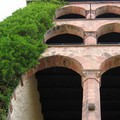March 08, 2016
Proseminar Gothic Fiction
 Proseminar, 2 SWS, Sprache Englisch
Proseminar, 2 SWS, Sprache Englisch
- Zeit und Ort: Di 12:15 - 13:45, KH 2.012
- Preliminaries:
- BA English and American Studies (neu): Zwischenmodul II Literature. (Zulassungsvoraussetzung: Zwischenmodul I: Thematisches Kombinationsmodul) Lehramt Englisch an Gymnasien (neu): Zwischenmodul L-GYM Literature. (Zulassungsvoraussetzung: Basismodul Literature) Lehramt Englisch an Grund-, Haupt- und Realschulen (neu): Zwischenmodul L-UF Literature. (Zulassungsvoraussetzung: Elementarmodul Literature)
- Description:
- Haunted castles surrounded by hostile nature, a “damsel in distress” prosecuted through labyrinthine dungeons by a ruthless villain, supernatural occurrences, conspiracies, madness, curses, creatures of the night – these are some of the stereotypical ingredients of a Gothic story. Clive Bloom characterizes the Gothic as “one of the most influential artistic styles and artistic genres of the last four centuries […]; one which has readily adapted itself to almost every geography, whether urban or rural, and has found expressions tailored to every culture” (Bloom 2). The Gothic is both a genre and a mode of writing which appears in many different incarnations. By turning the familiar into something uncanny, threatening and potentially deadly, the literature of fear is famous blurring the lines between good and evil, self and other. This seminar is going to identify the characteristics of Gothic writing and explore its transformations from Romantic origins over Victorian Gothic to contemporary texts. Among other themes, we will focus on aesthetic programmes and their impact on a variety of disciplines, the break of taboos, gender and sexuality, monstrosity and the human body, the problem of evil, as well as the commercialization of the Gothic in popular culture. Students wishing to attend this course should be prepared to give a short course presentation. It is highly recommended to read as many of the texts as possible before the beginning of the summer semester.
- Reading:
- Required texts (to be
purchased):
- Walpole, Horace. The Castle of Otranto (1764) – Oxford World’s Classics Edition.
- Radcliffe, Ann. The Italian (1797) – Oxford World’s Classics Edition.
- Charlotte Dacre, Zofloya, or The Moor (1806) – Oxford World’s Classics Edition.
- Henry James, The Turn of the Screw (1898) – Norton Critical Edition.
- Recommended reading
(optional):
- Bloom, Clive. Gothic
Histories: The Taste for Terror, 1764 to Present. New
York and London: Continuum, 2010.
- Broders, Simone. Wissenschaftliches
Arbeiten in Anglistik und Amerikanistik. Paderborn:
Fink/UTB, 2015.
- Gibaldi, Joseph. MLA
Handbook for Wríters of Research Papers. 7th
edition. New York: MLA, 2009.
Additional reading includes short texts by John Polidori, Bram Stoker, Joseph Sheridan LeFanu, Angela Carter, Jamaica Kincaid, and Patrick McGrath. - Materials:
- BBC
- Christianity. Christianity plays a huge role in
many Gothic texts, from evil monks selling their souls
to the devil to vampires being defeated with a crucifix.
This BBC religions special will inform you about the
basics of Christian beliefs and myths.
- BBC
- The Gothic This is a useful timeline of Gothic
writing from the beginnings to present.
A course syllabus will be available here shortly.
back to teaching main






Grundseminar Literature, Campus Regensburger Straße, Nürnberg